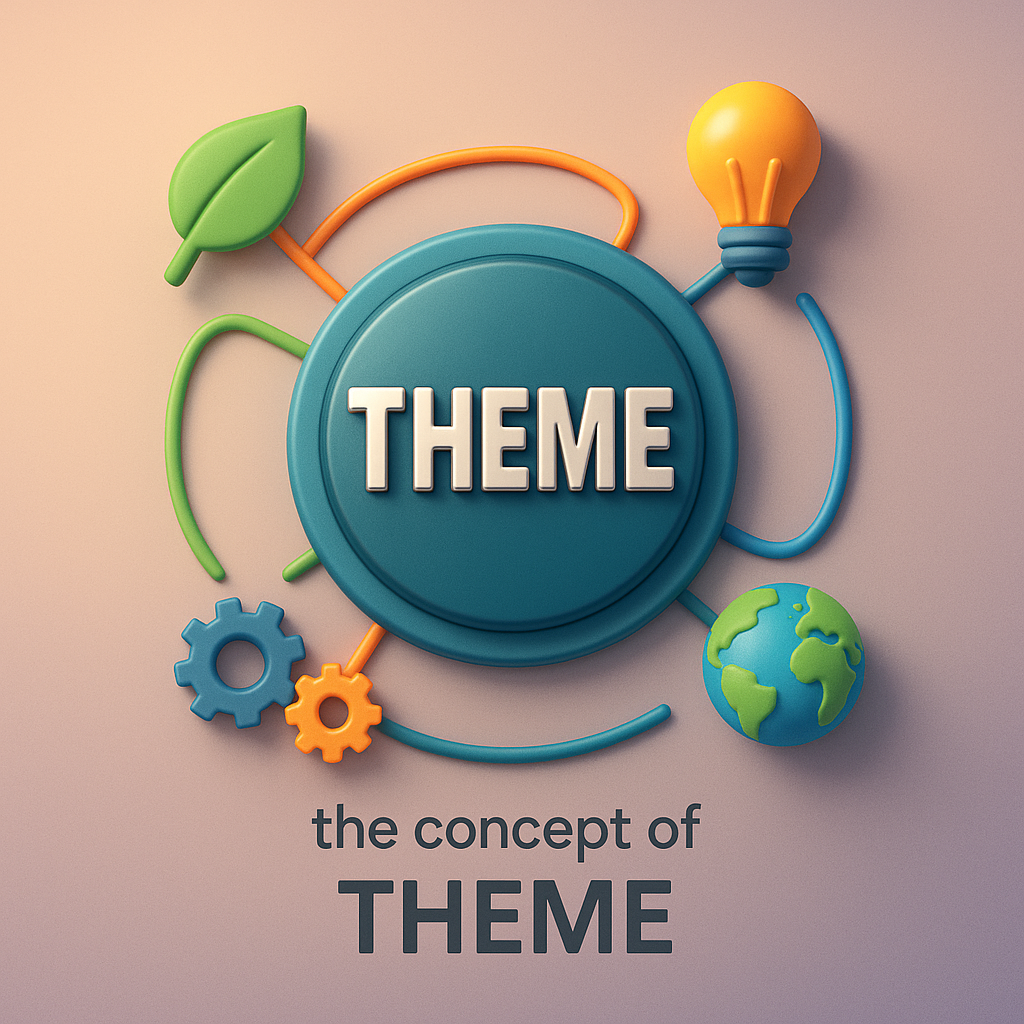Theme
Definition
Theme refers to the central topic, subject, or concept explored in a work of art, literature, music, or other forms of expression. It can also mean a recurring idea or motif in a particular context.
Parts of Speech
- Noun
Pronunciation
American English
- IPA Pronunciation: /θiːm/
- Respelling: theem
British English
- IPA Pronunciation: /θiːm/
- Respelling: theem
Etymology
The word "theme" originates from the Greek "thema," meaning "proposition, subject, or deposit," derived from "tithenai," meaning "to place" or "to set." It entered Middle English through Old French "tesme," later becoming "theme" in modern usage.
Derivatives
- Thematic (adjective)
- Thematically (adverb)
- Thematize (verb)
- Theme song (noun)
- Theme park (noun)
Synonyms
- Subject
- Topic
- Motif
Antonyms
- None
Usage
The noun "theme" is widely used to describe the main idea or concept in artistic or academic contexts. For example, "The theme of the novel revolves around forgiveness and redemption."
Related Terms
- Motif: A recurring element or idea in a creative work.
- Concept: A general notion or idea explored in a context.
- Genre: A category or classification of artistic works.
Detailed Definitions
Noun
- The central idea or subject of a work: Refers to the primary concept explored in literature, art, or music.
- Example: "The theme of love is prevalent in Shakespeare's plays."
- A specific topic or area of focus: Used to describe a particular area of interest or concentration.
- Example: "The conference focused on the theme of sustainability."
- A musical composition or recurring melody: Refers to a recognizable sequence of notes forming the basis of a piece.
- Example: "The symphony opens with a powerful theme played by the violins."
theme



🇨🇳 Chinese (Mandarin)
- 主题
- IPA Pronunciation: /ʈʂu˥˩ ti˥˥/
- English respelling: zhǔtí
- 题材
- IPA Pronunciation: /ti˥˩ tʂʰaɪ̯˥˥/
- English respelling: tícái
🇮🇳 Hindi
- विषय
- IPA Pronunciation: /vɪʂəj/
- English respelling: vishay
- थीम
- IPA Pronunciation: /ʈʰiːm/
- English respelling: thīm
🇪🇸 Spanish
- Tema
- IPA Pronunciation: /ˈt̪ema/
- English respelling: tema
- Asunto
- IPA Pronunciation: /aˈsunto/
- English respelling: asunto
🇫🇷 French
- Thème
- IPA Pronunciation: /tɛm/
- English respelling: thème
- Sujet
- IPA Pronunciation: /sy.ʒɛ/
- English respelling: sujet
🇸🇦 Arabic (Modern Standard Arabic)
- موضوع
- IPA Pronunciation: /moːˈdaʕ/
- English respelling: mawdūʻ
- نمط
- IPA Pronunciation: /namtʰ/
- English respelling: namt
🇧🇩 Bengali
- বিষয়
- IPA Pronunciation: /biʂoj/
- English respelling: bishoy
- থিম
- IPA Pronunciation: /t̪ʰim/
- English respelling: thim
🇷🇺 Russian
- Тема
- IPA Pronunciation: /ˈtʲemə/
- English respelling: tema
- Сюжет
- IPA Pronunciation: /ˈsʲʉʐɨt/
- English respelling: sjuzhet
🇵🇹 Portuguese
- Tema
- IPA Pronunciation: /ˈtɛmɐ/
- English respelling: tema
- Assunto
- IPA Pronunciation: /ɐˈsũtu/
- English respelling: assunto
🇮🇩 Indonesian
- Tema
- IPA Pronunciation: /tɛˈma/
- English respelling: tema
- Pokok
- IPA Pronunciation: /poˈkok/
- English respelling: pokok
🇩🇪 German
- Thema
- IPA Pronunciation: /ˈteːma/
- English respelling: Thema
- Motiv
- IPA Pronunciation: /moˈtiːf/
- English respelling: Motiv
🇯🇵 Japanese
- テーマ
- IPA Pronunciation: /teːma/
- English respelling: tēma
- 主題
- IPA Pronunciation: /ʃʉːdʑi/
- English respelling: shūdai
🇻🇳 Vietnamese
- Chủ đề
- IPA Pronunciation: /cʊwz ɗeːj/
- English respelling: chủ đề
- Đề tài
- IPA Pronunciation: /ɗeː˧ taːj˧/
- English respelling: đề tài
🇰🇷 Korean
- 주제
- IPA Pronunciation: /ʈ͡ʂuː.d͡ʑe/
- English respelling: juje
- 테마
- IPA Pronunciation: /tʰeː.ma/
- English respelling: tema
🇹🇷 Turkish
- Tema
- IPA Pronunciation: /teˈma/
- English respelling: tema
- Konu
- IPA Pronunciation: /koˈnu/
- English respelling: konu
🇵🇰 Urdu
- موضوع
- IPA Pronunciation: /mɵzuː/
- English respelling: mozū
- تھیم
- IPA Pronunciation: /ʈʰiːm/
- English respelling: thīm





